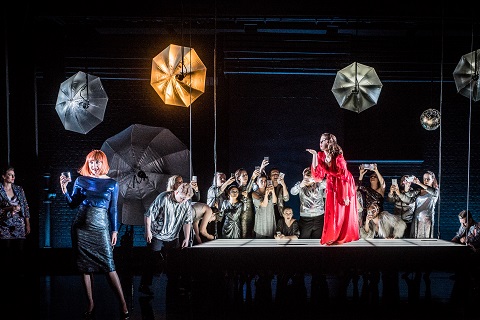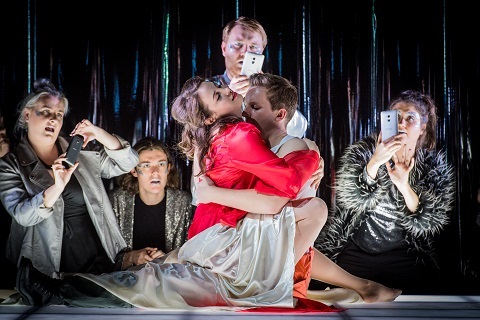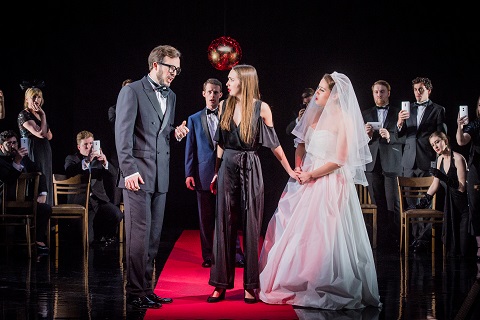
16 Nov 2018
Royal Academy's Semele offers 'endless pleasures'
Self-adoring ‘celebrities’ beware. That smart-phone which feeds your narcissism might just prove your nemesis.
English Touring Opera are delighted to announce a season of lyric monodramas to tour nationally from October to December. The season features music for solo singer and piano by Argento, Britten, Tippett and Shostakovich with a bold and inventive approach to making opera during social distancing.
This tenth of ten Live from London concerts was in fact a recorded live performance from California. It was no less enjoyable for that, and it was also uplifting to learn that this wasn’t in fact the ‘last’ LfL event that we will be able to enjoy, courtesy of VOCES8 and their fellow vocal ensembles (more below …).
Ever since Wigmore Hall announced their superb series of autumn concerts, all streamed live and available free of charge, I’d been looking forward to this song recital by Ian Bostridge and Imogen Cooper.
The Sixteen continues its exploration of Henry Purcell’s Welcome Songs for Charles II. As with Robert King’s pioneering Purcell series begun over thirty years ago for Hyperion, Harry Christophers is recording two Welcome Songs per disc.
Although Stile Antico’s programme article for their Live from London recital introduced their selection from the many treasures of the English Renaissance in the context of the theological debates and upheavals of the Tudor and Elizabethan years, their performance was more evocative of private chamber music than of public liturgy.
In February this year, Albanian soprano Ermonela Jaho made a highly lauded debut recital at Wigmore Hall - a concert which both celebrated Opera Rara’s 50th anniversary and honoured the career of the Italian soprano Rosina Storchio (1872-1945), the star of verismo who created the title roles in Leoncavallo’s La bohème and Zazà, Mascagni’s Lodoletta and Puccini’s Madama Butterfly.
Evidently, face masks don’t stifle appreciative “Bravo!”s. And, reducing audience numbers doesn’t lower the volume of such acclamations. For, the audience at Wigmore Hall gave soprano Elizabeth Llewellyn and pianist Simon Lepper a greatly deserved warm reception and hearty response following this lunchtime recital of late-Romantic song.
Collapsology. Or, perhaps we should use the French word ‘Collapsologie’ because this is a transdisciplinary idea pretty much advocated by a series of French theorists - and apparently, mostly French theorists. It in essence focuses on the imminent collapse of modern society and all its layers - a series of escalating crises on a global scale: environmental, economic, geopolitical, governmental; the list is extensive.
For this week’s Live from London vocal recital we moved from the home of VOCES8, St Anne and St Agnes in the City of London, to Kings Place, where The Sixteen - who have been associate artists at the venue for some time - presented a programme of music and words bound together by the theme of ‘reflection’.
'Such is your divine Disposation that both you excellently understand, and royally entertaine the Exercise of Musicke.’
Amongst an avalanche of new Mahler recordings appearing at the moment (Das Lied von der Erde seems to be the most favoured, with three) this 1991 Mahler Second from the 2nd Kassel MahlerFest is one of the more interesting releases.
‘And there was war in heaven: Michael and his angels fought against the dragon; and the dragon fought and his angels, And prevailed not; neither was their place found any more in heaven … that old serpent … Satan, which deceiveth the whole world: he was cast out into the earth, and his angels were cast out with him.’
If there is one myth, it seems believed by some people today, that probably needs shattering it is that post-war recordings or performances of Wagner operas were always of exceptional quality. This 1949 Hamburg Tristan und Isolde is one of those recordings - though quite who is to blame for its many problems takes quite some unearthing.
There was never any doubt that the fifth of the twelve Met Stars Live in Concert broadcasts was going to be a palpably intense and vivid event, as well as a musically stunning and theatrically enervating experience.
‘Love’ was the theme for this Live from London performance by Apollo5. Given the complexity and diversity of that human emotion, and Apollo5’s reputation for versatility and diverse repertoire, ranging from Renaissance choral music to jazz, from contemporary classical works to popular song, it was no surprise that their programme spanned 500 years and several musical styles.
The Academy of St Martin in the Fields have titled their autumn series of eight concerts - which are taking place at 5pm and 7.30pm on two Saturdays each month at their home venue in Trafalgar Square, and being filmed for streaming the following Thursday - ‘re:connect’.
The London Symphony Orchestra opened their Autumn 2020 season with a homage to Oliver Knussen, who died at the age of 66 in July 2018. The programme traced a national musical lineage through the twentieth century, from Britten to Knussen, on to Mark-Anthony Turnage, and entwining the LSO and Rattle too.
With the Live from London digital vocal festival entering the second half of the series, the festival’s host, VOCES8, returned to their home at St Annes and St Agnes in the City of London to present a sequence of ‘Choral Dances’ - vocal music inspired by dance, embracing diverse genres from the Renaissance madrigal to swing jazz.
Just a few unison string wriggles from the opening of Mozart’s overture to Le nozze di Figaro are enough to make any opera-lover perch on the edge of their seat, in excited anticipation of the drama in music to come, so there could be no other curtain-raiser for this Gala Concert at the Royal Opera House, the latest instalment from ‘their House’ to ‘our houses’.
"Before the ending of the day, creator of all things, we pray that, with your accustomed mercy, you may watch over us."

Self-adoring ‘celebrities’ beware. That smart-phone which feeds your narcissism might just prove your nemesis.
So suggests Olivia Fuchs, in her new production of Handel’s Semele for the Royal Academy of Music. King Cadmus of Thebes may proclaim ‘flashes of auspiciousness’ to the wedding guests awaiting the nuptials of his daughter Semele and Athamas Prince of Boethia at the Temple of Juno, when the Goddess accepts his sacrifice, but the guests’ celebratory chorus, ‘Lucky omens!’, proves deluded and short-lived.
Their mobile ’phones record every marriage-moment, Instagram-ready for public consumption, but Semele has her eyes on a higher prize: Jupiter. There’s nothing wrong with ambition, but when one’s desires are a merely the reflection of a mirror, aspirations become warped. Not content with being worshipped by mere mortals, Semele desires immortality itself, but her dalliance with the deities seals her own destruction: death not by thunder-bolt but by flash-bulb.
Fuchs’s modern-dress production finds some neat parallels between the marital infidelities of the Ovidian myth; the fears of Handel’s contemporary public that King George II would make his mistress, Amalie von Wallmoden - whom he had set up with a title and large income - Queen of England; and modern-day celebrity-dom, a realm fuelled not by heavenly spheres but by a paradoxical and toxic mix of excess and emptiness. If she pillories those who, in a crisis of identity and authenticity, believe they are ‘stars’ through the seemingly hackneyed opera-trope of the snapping mobile ’phone, then that seems to be Fuchs’ point: the celebs, and the malleable masses, never learn. There’s little star-dust to be found in a life lived as a commodity: an image without substance, offered up for public consumption.
The simple and clear designs, by takis, cleverly elucidate the incompatibility of the earthly and the celestial, and the destruction that is unleashed when these realms interact. During the overture, the curtain lifts to reveal a rather inauspicious wedding venue: a dingy, subterranean ‘bunker’ where, amid the assorted wooden chairs that anticipate the guests’ arrival, the principals enact a mime which usefully outlines allegiances and motivations. If their gestures are sometimes reminiscent of the expressionism of 1920s’ silent cinema, then the hint of histrionics is apt. The guests’ black evening-wear proves fitting when Jupiter’s eagle sweeps Semele up to the stars and events take a more funereal turn.
 Lina Dambrauskaite (Semele), Ryan Williams (Jupiter) and Chorus. Photo credit: Robert Workman.
Lina Dambrauskaite (Semele), Ryan Williams (Jupiter) and Chorus. Photo credit: Robert Workman.
An overhead light-box is lowered and, like a floating four-poster bed, wafts Semele upwards to Jove’s palace, where ‘endless pleasures, endless love’ await her. This Semele’s appetites, both material and carnal, prove insatiable: the chorus swap black for celestial silver and pander to her whims, while the enraged Juno-cum-Anna Wintour (a fine performance by Frances Gregory) plots her demise with her put-upon but willing PA, Iris. Lighting director Jake Wiltshire gives the star-spotted sky a glow of night-club pink and green, creating a palpable sense that the heavenly hedonism is going to come to an end with that metaphorical midnight-chime.
The young cast, the first of two, sang superbly on opening night. Even more impressively, they did so while accomplishing Fuchs’s busy stage directions. In the title role, Lina Dambrauskaitė skilfully showed how Semele’s solipsism grows, from sulky beginnings as she is reluctantly divested of her dressing gown and forced into a frothy gown, through sensuous self-indulgence when she subsequently sheds the candyfloss confection for a crimson silk camisole, to stubborn self-delusion as Jove’s acolytes fawn over and fondle her. Despite the dramatic distractions, Dambrauskaitė’s delivery of the coloratura was near faultless, peppered with some judiciously extravagant elaborations. Her tone was beautifully bright as she anticipated those ‘endless pleasures’, there was a delicious wryness about ‘Myself I do adore’ and few could surely deflect the determined, near-deranged, demands and desires which Dambrauskaitė threw at the hapless Jupiter in ‘No, no, I’ll take no less’.
 Thomas Bennett (Cadmus), Alexander Simpson (Athamas), Olivia Warburton (Ino,) Lina Dambrauskaite (Semele), and Chorus. Photo credit: Robert Workman.
Thomas Bennett (Cadmus), Alexander Simpson (Athamas), Olivia Warburton (Ino,) Lina Dambrauskaite (Semele), and Chorus. Photo credit: Robert Workman.
Ryan Williams did his best to sway his beloved though, and when the champagne, chocolates and flowers, helpfully supplied by Aimée Fisk’s Cupid, failed to win over the piqued and pouting Semele, it seemed for a moment that the sparkly Jimmy Choos might just do it. But, no. This Jupiter shaped his recitative wooing and worship elegantly, lovingly comforted in ‘Lay your doubts and fears aside’, beguiled with gentle lyricism in ‘Where’er you walk’, and warned his wilful woman with vocal punch and persuasiveness in ‘Ah, take heed what you press’. But, the beauties of Arcadia proved less appealing than the temptations of Semele’s own targets.
Olivia Warburton had impressed in the title role of Teseo at the London Handel Festival earlier this year, and here she made a strong impact as Semele’s sister, Ino, finding sadness and serenity in the role: her duet with Dambrauskaitė, when the sisters are briefly re-united in Jupiter’s paradisal gardens was one of the highlights. I’m not sure that her boogie-woogie wiggles to Athamus’s aria of acceptance, ‘Despair no more shall wound me’, sung with clarity and strong projection by Alexander Simpson, were entirely in character, but Warburton’s celebratory cartwheel was certainly impressive.
Thomas Bennett didn’t quite summon sufficient nobility of line as the distressed Cadmus, though his tone was warm; but his recalcitrant Somnus was strikingly sonorous despite his somnolence. Emilie Cavallo (Iris), Maya Colwell (Pasithea) and Joseph Buckmaster (Apollo) completed the fine line-up.
The Chorus were superb: their diction, strength, tone, co-ordination and choreography were all equally notable. The monumental terror and majesty of ‘O terror! and astonishment’ were terrifically emotive and powerful. I found the playing of the Royal Academy Sinfonia a little lacking in colour and character, though the lightness of the ensemble sound did make for some fleet runs. And, there was impressive virtuosity from individual players, especially from the bassoon player who underpinned Jupiter’s worried warning to ‘take heed’. The chamber organ was used to good effect.
At the close, Buckmaster’s Apollo, resplendent in purple suit and silver lame trainers, descended with a babe in his arms: the phoenix that arises from Semele’s ashes, the unborn child of mortal and god. But, despite the choral rejoicing, ‘Happy shall we be’, Athamus seemed disenchanted by Apollo’s reassurance that this baby Bacchus will be a god ‘more mighty than love’, taking umbrage at Ino’s apparent devotion to the new addition to their family and storming off in a jealous sulk, leading Ino to seek solace in father’s arms once more. So, this lieto fine was less than fortunate: disillusionment and disappointment, not dreams, will be your lot, Fuchs seems to say.
Claire Seymour
Handel: Semele
Semele - Lina Dambrauskaitė, Ino - Olivia Warburton, Cadmus/Somnus - Thomas Bennett, Athamas - Alexander Simpson, Jupiter - Ryan Williams, Juno - Frances Gregory, Iris - Emilie Cavallo, Cupid - Aimée Fisk, Apollo - Joseph Buckmaster, Pasithea - Maya Colwell; Director - Olivia Fuchs, Conductor - Laurence Cummings, Designer - takis, Lighting designer - Jake Wiltshire, Royal Academy Chorus and Sinfonia.
Susie Sainsbury Theatre, Royal Academy of Music, London; Wednesday 14 th November 2018.